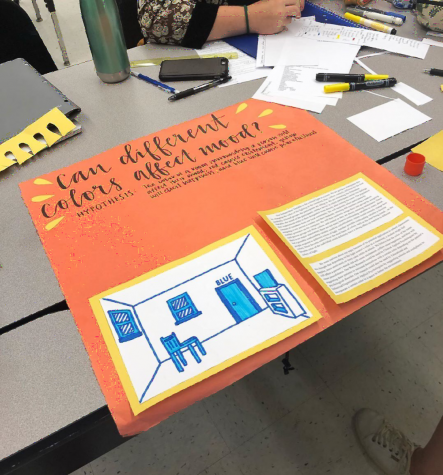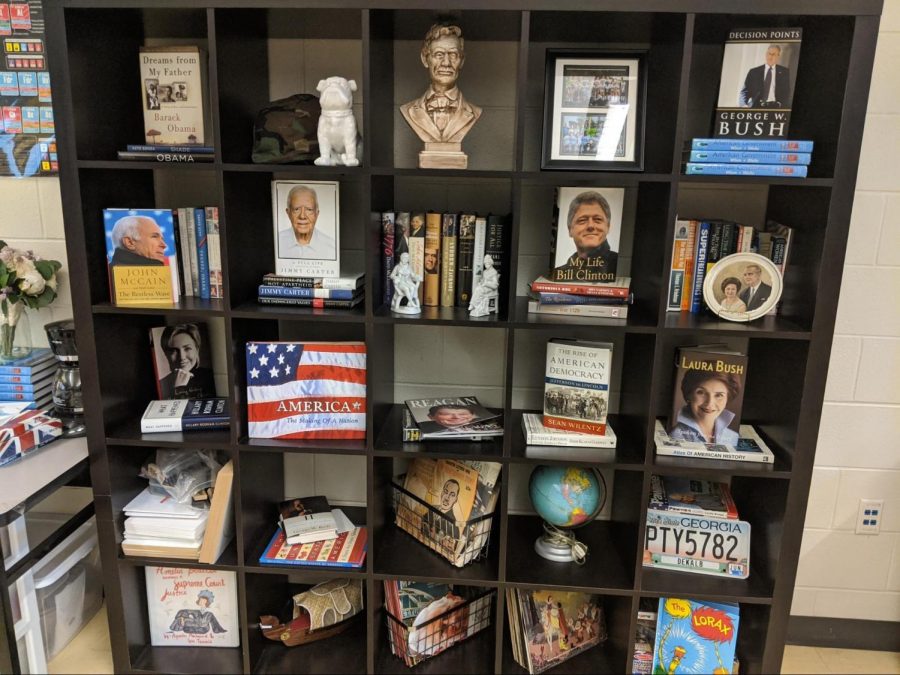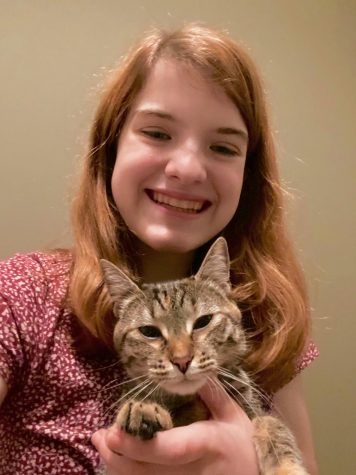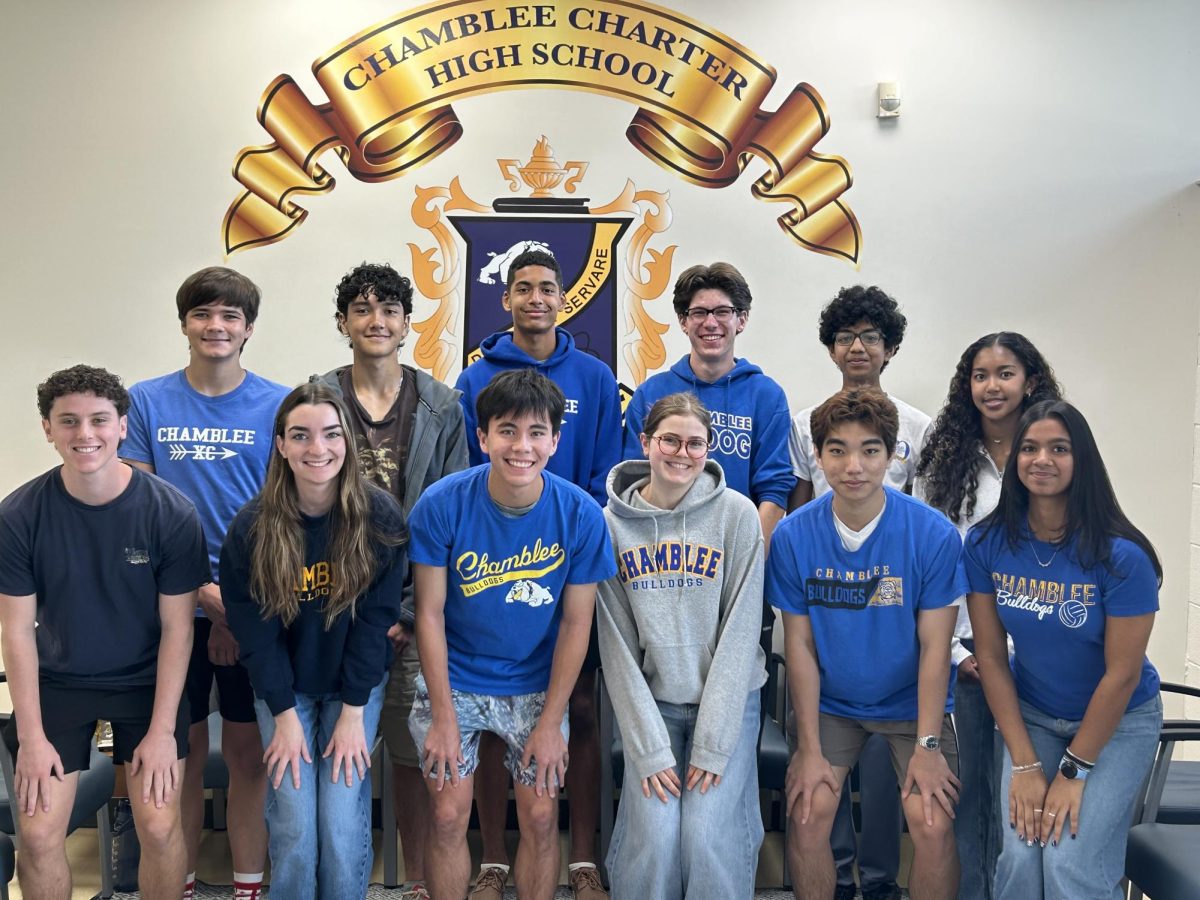Social Studies Department
Photo courtesy of Carson Ankeny
A cabinet in Ms. Kaspar’s room with much social studies themed decor.
January 13, 2020
AP U.S History
AP U.S. History is currently taught by two teachers, Jennifer Tinnell or Samantha Gilliam. Both classes are structured similarly with an emphasis on preparing students for the writing section of the AP exam, with DBQ’s (Document-Based Questions), SAQ’s (Short Answer Questions) and LEQ’s (Long Essay Questions) given frequently as assessments to mirror the AP exam. Under both teachers, these writing assignments account for 45% of your overall grade.
Tests in APUSH are typically AP stimulus-based questions, meaning students have to answer questions based on a quote, picture or graph. Gilliam includes reading check questions on her tests, but Tinnell’s tests are shorter and more high-stakes, with only 5-13 AP questions per test. These make up 30% of your grade, and reading checks and other assignments take up the remaining 25%.
The course is extremely fast-paced, but students in both classes say that the teachers manage their time well, taking the students through lectures, showing supplemental videos, and providing them with practice multiple choice questions and SAQ’s.
“On a basic day, we’ll take notes over a certain topic and discuss what happens. If we have a homework check that day, we’ll do that and do a worksheet, or we’ll learn how to structure our essays better,” said Esha Pamidi, a junior who is in Gilliam’s class, though Tinnell follows a similar format. “We work on all aspects of the AP test that the College Board will test us on.”
Junior Ayushi Mukund especially appreciates Gilliam’s notes.
“She makes all her own notes for each chapter and they’re really helpful because she makes them herself,” said Mukund. “She highlights the really important stuff so we don’t get distracted by unnecessary information.”
APUSH homework is typically reading one to two chapters a week. As junior Megan Woo explains, the amount of reading is similar to what was assigned for AP World History.
“The workload is pretty comparable to last year for World History,” said Woo, who is in Tinnell’s class. “The reading definitely feels less dense than the textbook we read last year. The American Pageant is more accessible I think.”
With weekly reading checks, this can add up to a lot of work, but students say it’s manageable as long as you manage your time properly and stay on top of your assignments.
“Take notes really diligently because you’re going to have to remember everything for every unit,” said junior Ayushi Mukund. “Don’t forget things otherwise it’s going to be hard to go back.”
Overall, Chamblee’s AP U.S. History classes prepare students well for the AP exam.
“I do feel really prepared for the AP exam, because Ms. Gilliam has been helping us improve, and my grades and my scores have been going up to a really good place where most people in that class would be able to get a 4 or 5,” said Pamidi.
U.S. History
U.S. History is a great class for students looking for a little less rigor and a history course without the need for enforcing College Board’s stringent requirements.
This course has been and is currently taught by many teachers across the school, including Iris Staten, Jennifer Tinnell, Tenisha Godley, Samantha Gilliam and Brian Ely, and the particular workload and class structure depends on the teacher.
Overall, students get the freedom in U.S. History to go more in depth into certain events in our country’s history without the need to cover all of the AP material. This freedom allows for more class discussion in an environment that suits some students more.
U.S. History teachers tend to spend class going over notes or PowerPoints and leading class discussions.
Most U.S. History classes have cumulative tests with stimulus-based questions (though not as hard as at the AP level) and quizzes in between tests to reiterate what students are learning. These are often vocabulary-based.
Homework involves studying and book work and sometimes projects, a workload that students describe as pretty easy to manage.
“I would say it’s a pretty reasonable workload,” said junior Madeline Mravkarov. “It’s not stressful the way AP classes are stressful, and it’s not like we’re not doing anything. It’s a pretty reasonable amount of work.”
Junior Rebeka Rab recommends supplementing the reading, especially if you get Ms. Tinnell.
“Use outside sources as well as the book because Ms. Tinnell’s quizzes and tests don’t come from the book,” said Rab.
When deciding between APUSH and U.S. History, consider the workload and the material.
“APUSH can be really time-consuming and really hard, and if you just want to enjoy the class, I would definitely suggest taking regular Accelerated U.S. History,” said junior Laine Dyess.
Also consider the pace and dynamic of the class.
If you’re really good at history and you’re willing to spend a lot of your time doing history, take AP, but if you want to branch out and go on little tangents and go more in depth about certain topics in history, [take this class],” said Mravkarov.
AP Psychology
AP Psychology is an elective social studies class that focuses on human behavior and mentality, including personality, learning and motivation. At Chamblee, it’s taught by Kurt Koeplin (Coach K), and there is also currently one section co-taught by Coach K and Brian Ely. It’s typically taken by seniors and some juniors in addition to their required economics or U.S. History classes.
Coach K takes pride in making the class fun and engaging for students. In addition to the typical PowerPoints and notes, Coach K shows his students videos from The Simpsons to emphasize his points, as well as psychology documentaries. In the brain and cognition unit, students do brain teasers as openers, and in the sleep unit, students get a nap day.
Because of these activities, students taking the class emphasize how enjoyable they find it.
“It’s really fun,” said senior Nina Evans. “We watch The Simpsons and it’s amazing. [Coach K] really knows what he’s talking about and it’s really easy to understand him. He does good notes and he tells good stories.”
It’s also a very laid-back class.
“It’s really relaxed,” said junior Fisher Isaacson. “He goes over a presentation for about half the class, and then usually we have some other activity to do, like a video to watch or an activity that we do as a class.”
The workload for AP Psych is manageable. Students are expected to read the textbook and study for tests, and Coach K assigns projects to go along with the reading, but there is not homework every night.
“I really would recommend reading all your notes. Read the whole chapter and make sure you know what the whole chapter is talking about,” said junior Rebeka Rab.
The projects are also a big part of the class.
“Most of the time, we just have arts and crafts projects where we have to draw about what we’re learning. It basically forces you to read the book,” said senior Jonina Bullock. “He’ll have us doing drawings for definitions in the chapters we’re supposed to read.”
Tests in AP Psych are every week. They are typically straight from the textbook and the notes, and students find them doable. They are however rigorous and typically have 50 questions. Coach K does allow test corrections.
All you need to do to succeed in AP Psych is to keep up with your reading.
“Read the book and you’ll be fine for every single thing that you do in that class,” said Bullock.
Because of Coach K’s straightforward and engaging teaching style, students generally feel prepared for the AP exam by the time it comes around.
One of Coach K’s typical projects for AP Psych: “Can different colors affect mood?”

AP Macroeconomics
For seniors, economics is a required social studies course. Rising seniors can sign up to take non-AP economics in the Principles of Economics course or either of the AP options: AP Macro or AP Micro/Macro. Macroeconomics is the study of the economy as a whole with concepts like inflation, growth and unemployment, and microeconomics is the study of individuals in the economy with concepts like households, businesses, supply and demand. AP Macro covers macroeconomics for the full year, and AP Micro/Macro covers microeconomics for the first semester and macroeconomics for the second. AP Micro by itself is not currently offered at Chamblee.
AP Macro is taught by Tenisha Godley, who students consider an effective teacher because she is able to explain challenging concepts in a digestible way.
“It’s really fun,” said senior Sonia Hassan. “Ms. Godley is a really good teacher. Macro itself is really confusing because there’s a lot of math in it. The graphs and stuff are completely different [than the math we’ve seen before] and there are so many different factors to each unit and they are also similar, but class every day is always really fun.”
A typical day in AP Macro involves PowerPoints and notes for learning, or worksheets, AP classrooms and Kahoots for reinforcement.
“Sometimes, we’ll take notes and she’ll just put a PowerPoint on the board and go over something,” said senior Ritu Reddy. “We get this big packet at the beginning of each unit and it has pretty much everything in it. After we learn something, she’ll make us go to a page in it and do a page.”
Homework in AP Macro is very minimal, as occasional Khan Academy assignments are pretty much the extent of the workload.
“You genuinely have no homework in that class,” said senior Amy Lin. “Also, if you pay attention in class and you do the practice because we do days of practice after learning a concept then you really don’t need to study for the tests and quizzes.”
Tests in AP Macro are typical AP-style tests with a multiple choice part and a FRQ part. Some students find them fairly reasonable, but others find them really hard.
Even though many students do poorly on the tests, Godley offers other work to allow students to balance their grades out.
“She does a lot of different practice and classwork, so as long as you’re on top of it, you’re pretty much fine, but the test grades really do matter,” said Hassan. “If you do well on the tests, you’re guaranteed an A.”
These other assignments give most students the opportunity to get an A.
“Make sure you keep track of all your deadlines because as long as you pay attention and turn things in, you’re going to be able to get an A,” said senior Caroline Freshwater.
Students also say that their work during class is preparing them well for the AP exam.
All in all, Freshwater recommends AP Macro over AP Micro/Macro because there is no difference in the credits or the GPA boost between the two classes.
“Everyone I know that’s in Micro/Macro is a lot more stressed for the exact same credit, and it’s still an AP class,” said Freshwater. “To colleges, AP Macro and AP Micro/Macro are the same credit, so it sounded a lot better than AP Micro/Macro to me.”
Lin says it a lot more concisely.
“Ms. Godley is amazing,” said Lin.
AP Micro/Macro
AP Micro/Macro is a faster-paced AP economics class taught by Carolyn Fraser that covers twice as much material as its AP Macro equivalent. Students have the option to take two AP exams (one for Micro, one for Macro) at the end, and the students that elect to take AP Micro/Macro are generally very motivated.
On a typical day in AP Micro/Macro, students receive packets called Morton worksheets that they work on and discuss as a class. Fraser will explain the concepts and go over the practice questions.
“While we’re doing the worksheets, she has people go up to the board and do them at the board,” said senior Hudson McGaughey. “It’s basically just the entire time volunteering to go up to the board. She explains it if you don’t understand it and you do it yourself on your own worksheet.”
There is very little homework in AP Micro/Macro because most of it is done in class. Occasionally, students need to do AP classroom assignments at home, but that’s about it.
“[The workload] is not that bad except right before a test or quiz,” said senior Nina Evans. “She gives us these packets that we work out of it and we usually do all our work in class, but right before a test, you’re going to want to study. It’s okay. It’s just the concepts are hard.”
Though the workload is doable, the tests are very difficult and come straight from AP Classroom and College Board questions. They require a lot of lateral thinking and logic.
“Everybody thinks tests are hard. There’s no corrections,” said senior Katie Kang. “They’re AP style questions, so it’s going to be hard.”
They are, however, not impossible.
“If you study and look over the packets, everyone generally does pretty well, but they can be pretty difficult,” said senior Nick Markiewicz.
To prepare for the tests, students recommend studying a lot and learning the concepts well. Because the material is hard and the course is so quick, a lot of studying will be required to prepare for one or both of the AP exams.
Kang advises prospective students to account for the difficulty and pacing difference.
“When they say that it’s a lot of work, that Micro/Macro is a lot more work than Macro, it actually is,” said Kang. “Everyone was recommending taking Micro/Macro saying that it wasn’t that much harder than Macro, but it does go really fast.”
All in all, Micro/Macro and Macro are very different.
“There’s not really a balance between Micro/Macro and just Macro,” said McGaughey. “Macro is really slow but Micro/Macro is super fast, so anyone who just wants to learn stuff really fast is going to have a good time in it, but it’s a hard class.”
AP Government and Politics
In freshman year, it’s a requirement to take a civics and geography course. While some students elect to simply take the normal course, others go above and beyond, taking both AP Government and Politics as well as AP Human Geography to satisfy the course requirement. While the AP class is mostly made up of freshmen, it’s available to all students.
“It’s a fun and interesting AP intended for freshmen, but anyone can take it,” said senior Jack Dillon. “You get the AP credit for taking a class that is actually fun and informative.”
A typical day in class is spent listening to the teacher, Chloe Kaspar, reviewing a PowerPoint, watching videos related to the current topic of study, or doing fun interactive activities related to the course.
“[Mrs. Kaspar] is a really good teacher. She’s great at making sure it’s a fun course that isn’t too hard, while also helping students to actually understand the material and connect it to our political situation right now,” said junior Sam Wondsen. “My favorite part of the class is when we talk about current political issues or discuss things like the impeachment process that are really big right now.”
At the end of every unit, there’s a cumulative test about all of the material in the unit. Students in the class agreed that the tests were difficult, but not as hard as many other APs.
“Your grade definitely reflects how hard you work in the class,” said junior Kareem Sange. “It’s definitely not an easy A, you do need to pay attention in class and study for the tests. But it isn’t hard just to be hard, it’s hard because [Mrs. Kaspar] really wants you to learn and know the material.”
Whether they were a freshman or an upperclassman, the students interviewed all agreed that AP Gov was among the top classes to take at Chamblee.
“I’ve really enjoyed taking [AP Gov] as one of my first AP courses,” said freshman Nitin Rao. “I’ve learned a lot in the class, not just about the course, but also about what I can actually expect out of future AP classes. So I think this class is very valuable, and I recommend that others take it.”
Dillon agreed that the class was definitely worth taking, no matter your grade.
“The class is pretty easy, it’s fun, it’s interesting. It’s a good first AP class to take, or a good AP class to take in your senior year,” Dillon said. “If you’re a junior, you can take it at the same time as APUSH (AP US History) or if you’re a senior, you’re taking economics at the same time. So you can relate it to your other courses, no matter your grade level.”
AP World History
As the first real history course of a student’s career at Chamblee High School, AP World History has the difficult task of covering all of human history in just about 180 instructional days. It draws upon the basic history that sophomores have already learned in elementary and middle school, expanding upon it and going into a lot more detail.
“It’s a lot at first,” said sophomore Tyler Sun. “I remember looking at the textbook in those first couple weeks, and having absolutely no idea what was going on, like all the information on the pages was just not registering with my brain.”
But AP World History teacher Teresa Abernathy tries to make the course fun, and keep the textbook at home and out of the classroom.
“We do a lot of fun activities and projects in her class,” said sophomore Aadi Saha. “The notes we do in class are also really useful for determining what is most important in a chapter.”
In terms of notes, the students interviewed agreed that taking your own notes outside of class on the textbook, and actually studying and reading those notes was essential to getting a good grade in the class.
“You have to put in the effort if you want to end up with a good grade,” said sophomore Alex Jovanovic. “You can’t just coast by like you can in some other classes, you have to read, study, do the note cards and study guides, everything, if you want to actually know what you’re doing when you get a test or a quiz.”
While there is certainly an emphasis on tests and quizzes in preparation for the AP exam in second semester, there is also a certain element of fun in the course.
“There’s some really fun projects and assignments we’ve done,” said sophomore Adam Pohl. “We also sometimes just have chill days, where we can just study, or where we’ll just watch a video about whatever time period we’re in and answer some questions about it. It all depends on the day what we’ll actually do in class ,but it’s never just boring or busy work. You’re always learning something or moving towards a goal.”
While students agreed that the course is certainly not easy, they all recommended that current freshmen should certainly take the class next year, so long as they have an interest in history.
“If you hate history, don’t take the class,” said Saha. “But if you have any interest at all, and you’re going to be driven to put in the work to get a good grade, then you should definitely take it. It’s a great class, and I highly recommend it.”
AP Human Geography
Similar to AP Gov, students can take AP Human Geography in freshman year to qualify as their geography credit for that year, or they can take it later on just to take an AP class. The course is taught by Jesse Hamilton, and covers topics from culture, to the interaction of humans and the environment, to global politics.
“It’s really interesting to get to learn more about the world and the way everything interacts,” said freshman Pierce Rosenhaft. “Being able to learn about how all of this stuff, the environment, culture, language, race, country, how all of these things interact and form who we are is really interesting to me.”
In the class, assignments range from creating presentations in groups, to watching films depicting different cultures and assessing the elements of Human Geography students have learned about depicted in the movies.
“It’s honestly a pretty fun class,” said freshman Robert Watts. “I feel like I’m learning, and I do feel pretty prepared for the [AP] exam, even though it’s not until next semester. I’ve learned a lot of content in the class I didn’t know before, and understand how all of this stuff works a lot better.”
As far as out-of-class work goes, there isn’t a lot in the class.
“You do have to read your textbook at home, and do vocabulary words and there’s occasionally some classwork sheet that you’ll have to finish for homework,” said freshman Krishna Srivasta. “But most of it, you can get done in class. So the workload once you get home isn’t a whole lot, so long as you do your work in class when you’re supposed to.”
Students in the class heavily emphasized the positive combination of AP Human Geography and AP Government and Politics as classes to take in the same year.
“In both this class and AP Gov, we learn a lot about current events,” said Rosenhaft. “I’ve learned a lot about what’s going on in the world from the articles we read in AP Human [Geography] and a lot about the United States and our government from what we learn in AP Gov. So I think the two courses go very well together. I recommend that any freshmen next year take both of these classes, they are really good introductions to AP classes, and both are very interesting.”
Principles of Economics
Taught by Robin Mask-Bareford, Principles of Economics is the standard economics course all seniors are required to take in order to graduate. In comparison to the AP counterparts, Principles of Economics offers an alternative to the fast-paced courses for those without a specific affinity or passions for economics that they wish to fulfill through an AP course.
“Economics is pretty boring and I don’t really understand it,” said senior Elizabeth Huth. “I mean, this class has helped me understand it a little bit more than I did before. The teacher is nice as well, and she really wants us to understand. So that’s a plus.”
The class, according to those interviewed, is not too difficult in the homework department, and instead derives its difficulty from the tests.
“Your grade is mostly your test grades, there isn’t really much homework,” said senior Sofia Renneke. “So you should definitely know what you’re doing on the tests if you want to do well in the class, since those will end up making up most of your grade.”
Some seniors in the class simply decided to take the class because it was their last year of high school, and they didn’t want to deal with a stressful, math-based AP course.
“The course says it’s social studies, but it’s really just a bunch of math,” said senior Connor Pennington. “Now, that doesn’t change if you take the AP or not, it’s still a bunch of math that you’ll have to do. But in Principles [of Economics,] it’s definitely a lot less stressful, it’s a lot more forgiving. It’s slower paced.”
The course presents an alternative to AP Macroeconomics, or the even faster-paced combined course of AP Micro and Macro Economics, an alternative that is geared for those who want the credit for the course to graduate, but who don’t have an interest in economics.
“I don’t plan to do anything with economics really in my life after high school,” said senior Michael Kovakich. “I didn’t take the AP courses because it would just be too much to deal with, when I can learn about the same stuff in this class without all the work and tests and all that. By taking this class, I get to learn at a much better pace for me, and honestly just a much better pace for anyone who isn’t some economics genius.”
The students interviewed seemed to agree that Principles of Economics was a good alternative course to the AP courses.
“It’s not like you don’t learn anything at all in the class,” said Pennington. “You’re actually learning very important things. You’re just learning at a way more digestible speed than the AP students are. You’re actually able to understand what you’re learning instead of just memorizing formulas and terms for a test before forgetting them. If you don’t love economics, I definitely recommend taking this course instead of the AP, so that you can actually learn the stuff instead of having it come in one ear and out the other.”












